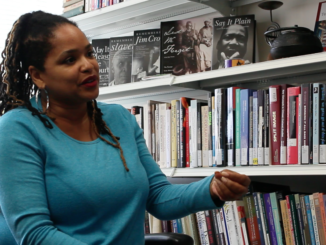
Pepperdine sororities are working toward a more inclusive future by making strides to combat national stereotypes that all sorority women have to be thin, blond and beautiful.
While there’s still a long way to go, sorority leaders are making structural changes to debunk the role of beauty standards and biases in the rush and initiation process that may transform the Greek system at Pepperdine. Greek Life Advisor Allison Green said she is committed to ushering in that change.
“We really want to emphasize values-based recruitment,” Green said.
That’s a key phrase motivating her — and the rest of sorority leadership — right now as they focus on potential new members’ passions and personalities.
Leaders said they hope this method of recruitment will be the key to resolving the criticisms Pepperdine sororities have received. Many students think that the university’s sororities follow national stereotypes of sorority women that tend to promote “thin” over any other quality. Sorority leaders said that if they can convince members to push past their initial impressions and judgments of outward appearance, sororities could start to look a little less homogenous.
Recruitment now
Potential New Members — or PNMs — are asked to dress “snappy casual” for recruitment and to look their “personal best,” Green said. Green recognized how this language fed perceptions about Greek beauty standards.
“People make the assumption, ‘Oh, it’s about appearances,’” Green said.It’s no surprise that people think that. Studies show that sorority recruitment exacerbates body-image issues and self-objectification in college females, Catherine Mitchell wrote in 2013 in The Atlantic. After all, IZA, the Institute for Study and Labor in Germany, found in 2013 that sorority women in the U.S. tend to have slightly lower BMIs than other non-affiliated women nationwide. The following collage illustrates this contrast.

A Chicago study in 2010 linked Greek life to low self-esteem, according to Spinnaker. The recruitment process easily lends its participants to physical comparison.
“Women do look around and just kind of compare themselves to the other women who are going through recruitment,” said senior Jolie Lowe, an international studies major, the vice president of member development in Tri Delta and the head of recruitment on Pepperdine’s Panhellenic Council. “It’s easy to look at someone who is getting called back to more chapters than you do during recruitment and think ‘This could be because of the way I look.’”
PNMs may feel that their physical appearance is affecting which sororities they get called back to, but it may not be the case.
Behind the scenes of recruitment
It’s not good to judge a book by its cover, but Morgan Clinton, the director of leadership at Pi Beta Phi and co-president of the Healthy Bodies branch of the university’s Student Wellness Advisory Board said that is often what happens in recruitment.
PNMs only interact with sorority members in brief segments throughout the recruitment process. It can be hard to bypass initial appearance-based impressions and make a meaningful connection with someone in such a short time, Clinton, senior psychology major, said.
The whole recruitment process going virtual this semester only made matters worse, Clinton said.
“You’re just seeing their face when you’re going through this process because it’s virtual,” Clinton said. “So it’s even harder not to have that implicit like ‘OK, are they pretty?’”
But Pepperdine sororities are becoming increasingly aware of their biases and putting in effort to correct them, Green said.
“I’m very aware that there’s room for improvement,” Green said.
The three sorority leaders interviewed agreed that the key to improvement is creating an open, honest dialogue about the issues of unrealistic beauty standards and unfair physical comparison.
Pi Beta Phi had one of these dialogues before virtual recruitment began, Cinton said.
“We had that conversation as a chapter,” Clinton said. “Like, don’t just look at the physical, you know, truly make an effort to have a good conversation, even though you’re on your screen.”
Members making a conscious effort to avoid biases of physical appearance will free themselves up to discover what really matters in the recruitment process, Green said.
“We’re realizing beauty is not one of our values,” Green said.
Pepperdine sororities want girls who are “real and authentic women as opposed to women that are only beautiful,” Katie Thompson, member vice president at Gamma Phi Beta, said.
“We recruit based on the personality and based on the person,” Thompson, junior biology major, said. “But I know that that is not always the case across national boards and sororities and I think that is something that we all need to be fighting actively against.”
Revising recruitment
Pepperdine sororities can join that fight by revising some aspects of the recruitment process, Thompson said.
Thompson said she doesn’t think the recruitment dress guidelines are necessary. The dress guidelines are a remnant from a time when sororities were based solely off of appearances, Thompson said.
Green wants to revise Pepperdine’s recruitment information.
“We are hoping that we can further clarify to still veer away from that perception that we only want pretty types of girls,” Green said. “Because that’s never been a part of our organization’s core values.”
Sorority members are learning to push past the surface level with PNMs and look for those “core values,” Green said. Meanwhile, they are encouraging PNMs to consider more than the appearances of a sorority’s members, Lowe said. Lowe gave some recommendations for questions they should ask.
“What are the values of this chapter?” Lowe said. “What are they fighting to accomplish? What’s their philanthropy? What is the charity that they’re working for and what do I see in them that I could also see in myself?”
If students go in with those “internal things rather than the external,” Lowe said, they’ll end up in the sorority that is right for them.
Where this road leads
The long-term effects of a values-based recruitment are many and positive. Thompson said she loves the way her sorority has expanded to include all kinds of women.
“Being surrounded by women of all shapes and sizes and ethnicities and looks that are unapologetically proud to be who they are, is very empowering and has given me a lot of confidence,” Thompson said.
In addition to new recruitment strategies, sorority leaders are pushing for a healthier culture amongst the chapters.
“It’s really important to celebrate all different body types, all different heights, all different weights, all different hair types,” Green said.
Jennifer Harriger, a psychology professor and the advisor of the Pepperdine branch of The Body Project, believes that creating a space to discuss issues of health, body image, beauty standards, etc. is the first step toward a more body-positive culture at Pepperdine.
Universities need to create spaces where women can “talk through these issues and recognize they’re not alone,” Harriger said.
It will take time for the culture to change for the better, Lowe said.
“There are always going to be individuals in any organization that have an image that they want to portray and might pressure other people to conform to that image,” Lowe said. “But we do everything that we can to try to push back against that, because we want our chapters at Pepperdine to be an opportunity for women to become stronger leaders, to meet other women who are fighting for the same things that they are.”
Sorority leaders know the damage a toxic culture can do. Thompson said she understands why and how people are hurt by Greek life now and why they have been in the past.
But she has hope for the future.
“I just hope that moving forward, specifically in recruitment, that we can see some really positive changes,” Thompson said.
Annie Blankenship completed the reporting for this story in Jour 241 in Fall 2021 under the supervision of Dr. Christina Littlefield and Dr. Theresa de los Santos. Dr. Littlefield supervised the web version of the story.




